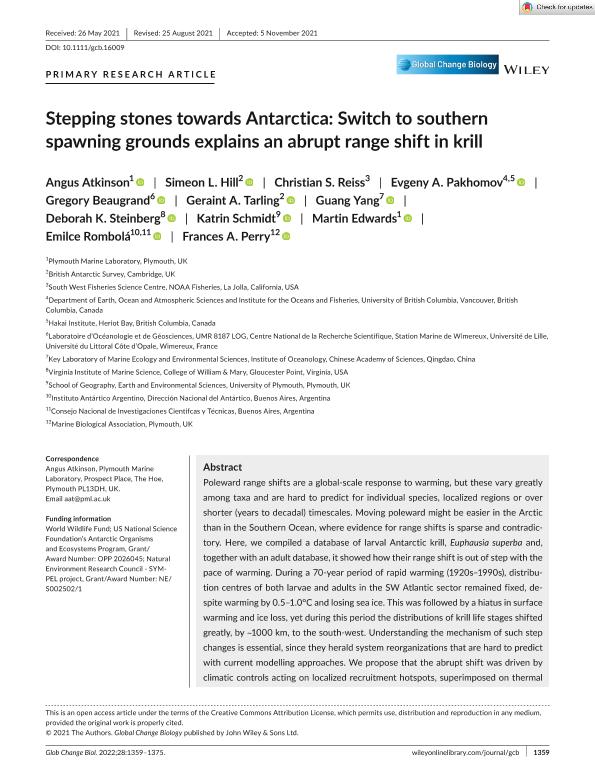Mostrar el registro sencillo del ítem
dc.contributor.author
Atkinson, Angus
dc.contributor.author
Hill, Simeon L.
dc.contributor.author
Reiss, Christian S.
dc.contributor.author
Pakhomov, Evgeny A.
dc.contributor.author
Beaugrand, Gregory
dc.contributor.author
Tarling, Geraint A.
dc.contributor.author
Yang, Guang
dc.contributor.author
Steinberg, Deborah K.
dc.contributor.author
Schmidt, Katrin
dc.contributor.author
Edwards, Martin
dc.contributor.author
Rombola, Emilce Florencia

dc.contributor.author
Perry, Frances A.
dc.date.available
2023-02-08T13:12:05Z
dc.date.issued
2022-02
dc.identifier.citation
Atkinson, Angus; Hill, Simeon L.; Reiss, Christian S.; Pakhomov, Evgeny A.; Beaugrand, Gregory; et al.; Stepping stones towards Antarctica: Switch to southern spawning grounds explains an abrupt range shift in krill; Wiley Blackwell Publishing, Inc; Global Change Biology; 28; 4; 2-2022; 1359-1375
dc.identifier.issn
1354-1013
dc.identifier.uri
http://hdl.handle.net/11336/187269
dc.description.abstract
Poleward range shifts are a global-scale response to warming, but these vary greatly among taxa and are hard to predict for individual species, localized regions or over shorter (years to decadal) timescales. Moving poleward might be easier in the Arctic than in the Southern Ocean, where evidence for range shifts is sparse and contradictory. Here, we compiled a database of larval Antarctic krill, Euphausia superba and, together with an adult database, it showed how their range shift is out of step with the pace of warming. During a 70-year period of rapid warming (1920s–1990s), distribution centres of both larvae and adults in the SW Atlantic sector remained fixed, despite warming by 0.5–1.0°C and losing sea ice. This was followed by a hiatus in surface warming and ice loss, yet during this period the distributions of krill life stages shifted greatly, by ~1000 km, to the south-west. Understanding the mechanism of such step changes is essential, since they herald system reorganizations that are hard to predict with current modelling approaches. We propose that the abrupt shift was driven by climatic controls acting on localized recruitment hotspots, superimposed on thermal niche conservatism. During the warming hiatus, the Southern Annular Mode index continued to become increasingly positive and, likely through reduced feeding success for larvae, this led to a precipitous decline in recruitment from the main reproduction hotspot along the southern Scotia Arc. This cut replenishment to the northern portion of the krill stock, as evidenced by declining density and swarm frequency. Concomitantly, a new, southern reproduction area developed after the 1990s, reinforcing the range shift despite the lack of surface warming. New spawning hotspots may provide the stepping stones needed for range shifts into polar regions, so planning of climate-ready marine protected areas should include these key areas of future habitat.
dc.format
application/pdf
dc.language.iso
eng
dc.publisher
Wiley Blackwell Publishing, Inc

dc.rights
info:eu-repo/semantics/openAccess
dc.rights.uri
https://creativecommons.org/licenses/by/2.5/ar/
dc.subject
ABRUPT COMMUNITY SHIFT
dc.subject
ANTARCTIC KRILL
dc.subject
ECOSYSTEM SHIFT
dc.subject
EUPHAUSIID
dc.subject
MANAGEMENT
dc.subject
MARINE PROTECTED AREAS
dc.subject
RANGE SHIFT
dc.subject
RECRUITMNET
dc.subject
SPAWNING
dc.subject.classification
Biología Marina, Limnología

dc.subject.classification
Ciencias Biológicas

dc.subject.classification
CIENCIAS NATURALES Y EXACTAS

dc.subject.classification
Conservación de la Biodiversidad

dc.subject.classification
Ciencias Biológicas

dc.subject.classification
CIENCIAS NATURALES Y EXACTAS

dc.title
Stepping stones towards Antarctica: Switch to southern spawning grounds explains an abrupt range shift in krill
dc.type
info:eu-repo/semantics/article
dc.type
info:ar-repo/semantics/artículo
dc.type
info:eu-repo/semantics/publishedVersion
dc.date.updated
2023-02-06T10:18:32Z
dc.journal.volume
28
dc.journal.number
4
dc.journal.pagination
1359-1375
dc.journal.pais
Reino Unido

dc.journal.ciudad
Londres
dc.description.fil
Fil: Atkinson, Angus. Plymouth Marine Laboratory; Reino Unido
dc.description.fil
Fil: Hill, Simeon L.. British Antarctic Survey; Reino Unido
dc.description.fil
Fil: Reiss, Christian S.. National Oceanic and Atmospheric Administration; Estados Unidos
dc.description.fil
Fil: Pakhomov, Evgeny A.. University of British Columbia; Canadá. Hakai Institute; Canadá
dc.description.fil
Fil: Beaugrand, Gregory. Université de Lille; Francia. Université du Littoral Côte d’Opale; Francia
dc.description.fil
Fil: Tarling, Geraint A.. British Antarctic Survey; Reino Unido
dc.description.fil
Fil: Yang, Guang. Chinese Academy of Sciences; República de China
dc.description.fil
Fil: Steinberg, Deborah K.. Virginia Institute Of Marine Science; Estados Unidos
dc.description.fil
Fil: Schmidt, Katrin. University Of Plymouth; Reino Unido
dc.description.fil
Fil: Edwards, Martin. Plymouth Marine Laboratory; Reino Unido
dc.description.fil
Fil: Rombola, Emilce Florencia. Consejo Nacional de Investigaciones Científicas y Técnicas; Argentina. Ministerio de Relaciones Exteriores, Comercio Interno y Culto. Dirección Nacional del Antártico. Instituto Antártico Argentino; Argentina
dc.description.fil
Fil: Perry, Frances A.. Marine Biological Association; Reino Unido
dc.journal.title
Global Change Biology

dc.relation.alternativeid
info:eu-repo/semantics/altIdentifier/url/https://onlinelibrary.wiley.com/doi/full/10.1111/gcb.16009
dc.relation.alternativeid
info:eu-repo/semantics/altIdentifier/doi/http://dx.doi.org/10.1111/gcb.16009
Archivos asociados
